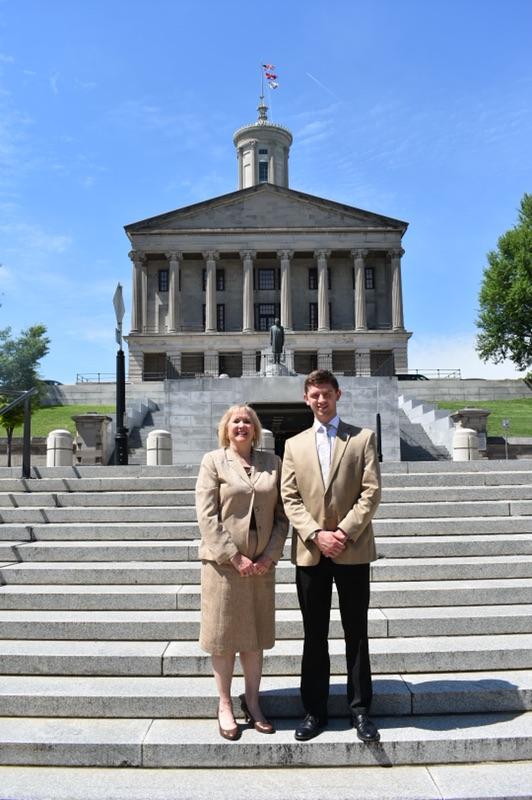
As the Tennessee General Assembly prepared to enter the final week of the 2019 legislative session, state senators acted on a wide variety of important bills. The House and Senate leadership have begun working to resolve the differences between their two budgets to be able to pass the final budget and adjourn for the year.
State Senators approve key bills in preparation to adjourn 2019 legislative session
State Budget– The Senate Appropriations Subcommittee adopted a schedule to the appropriations bill on Thursday, outlining a plan which calls for fiscal restraint and continued tax relief, while providing expanded TennCare coverage for in-home care for children with severe and medically complex disabilities. The plan continues the Senate’s efforts to cut taxes, take care of the state’s most vulnerable citizens, ensure public safety, keep promises made to state employees, and maintain fiscal discipline. The legislation is also aimed at preserving the fiscally conservative practices that has earned Tennessee recognition as the best managed state in the nation.
Key points of the Senate plan include:
Cutting Tennessee’s professional privilege tax by $100 to provide relief and encourage economic growth using the online tax windfall to fund it as promised;
Providing a Katie Beckett waiver to expand Part A TennCare coverage for in-home care for children with severe and medically complex disabilities by utilizing a stable source of revenue to sustain the program long-term;
Raising salaries of correctional officers and counselors employed by the Tennessee Department of Corrections to address the growing number of vacancies in positions that are critical to public safety and state prison operations;
Keeping promises to state employees by paying the Other Post-Employment Benefits (OPEB) debt obligation, in keeping with the state’s sound financial practices; and
Recognizing fiscal restraint in state government operations by returning $6 million reserved in the governor’s budget to increase the General Assembly’s operating fund.
State Senators are asking for TennCare to evaluate cost for Part B of the Katie Beckett waiver so lawmakers can continue with a measured approach to provide funds for the needed program.
The budget is one of the last measures passed by the legislature before adjournment.
Legislation aiding healthcare consumers advances in Tennessee Senate
A couple of bills aiding healthcare consumers advanced in the State Senate last week, including the Tennessee Right to Shop Act, a consumer-driven program which provides patients with more transparency regarding the costs of healthcare services in their network. Senate Bill 510 seeks to disclose the cost for certain procedures so the patient can make an informed choice that fits their within their budget or deductible. It requires health insurance providers to implement a shopping and decision support program which discloses the costs of non-emergency outpatient services or procedures to enrollees in their plan.
Approximately 40 to 50 percent of all healthcare services are shoppable, including physical and occupational therapy services, radiology and imaging services, laboratory services, and infusion therapy.
A consumer choice of a lower-cost option could also benefit insurance companies. Under the legislation, health insurers would be allowed to offer incentives to enrollees for choosing the lower-cost option, such as providing consumers up to 50 percent of the difference for going to a less expensive provider, as long as the enrollee’s reward does not exceed the cap of $600 per year. Insurance companies, however, would not be allowed to require or steer a patient to use a lower cost provider. It is strictly voluntary on the part of the patient.
Health Care Consumers / Transparency in Billing Practices – The full Senate also passed the Healthcare Billing Clarity Act which will help patients determine what charges come from a hospital and what charges come from a specialty physician who works there. According to the Urban Institute, 54 percent of patients in the United States claim that their medical billing paperwork and invoices are confusing.
Often times, hospital bills include charges for supplies and equipment labeled as specialty service charges which are mistaken by patients as the total amount being billed by their physician. Senate Bill 613 restricts hospital billing statements from including any language that refers to specialty healthcare services rendered at the hospital to avoid confusing the patient into thinking the bill came from their specialty physician.
Last year, the General Assembly approved legislation which called for transparency in medical charges by requiring a hospital to provide an estimate to patients regarding out-of-network charges.

It was great having Diana Cho, a student at A.L. Lotts, and Riley Aylor, a student at Blue Grass, as my Pages for the Day. These girls are winners
of the Secretary of State’s Civics essay contest
on leadership.
Senate approves Human Life Protection Act to protect the life of unborn children
The full Senate voted last Monday evening to strengthen Tennessee’s pro-life stance with approval of the Human Life Protection Act. Senate Bill 1257 would proactively trigger the restoration of Tennessee’s abortion laws prior to the Roe v. Wade ruling, if and when the power to regulate abortion is returned to the states, to protect the life of unborn children.
When the United States Supreme Court handed down the Roe v. Wade decision in 1973, it rendered Tennessee’s strong abortion laws null and void, which prohibited abortion except when the life of the mother was at risk. Since then, Tennessee Republicans have worked diligently to prevent abortion through the passage of numerous laws. This includes initiating a constitutional amendment adopted by Tennessee voters that allowed the General Assembly to enact common-sense restrictions, like a 48-hour waiting period and a requirement that abortion facilities be regulated as surgical centers with proper medical professionals on staff. It also included action to defund Planned Parenthood.
The restoration of state power over abortion would occur in one of two ways under the legislation. The U.S. Supreme Court could issue a decision overruling Roe v. Wade, or an amendment could be adopted to the U.S. Constitution that returns the authority to regulate abortion back to the states.
Under this bill, the Attorney General and Reporter would be required to notify the Tennessee Code Commission in the event that Roe v. Wade is overturned or a U.S. constitutional amendment is adopted. Then thirty days following either event, Tennessee’s abortion law would be restored to its 1972 statute.
Six states have passed trigger legislation, including Arkansas, Kentucky, Louisiana, Mississippi, North Dakota, and South Dakota. In addition, Missouri, Ohio, Oklahoma and Texas are also currently considering similar legislation.
In other action, the full Senate approved legislation requiring abortion complications in Tennessee to be reported. In 2017, there were 10,810 induced abortions in Tennessee, according to the Tennessee Department of Heath which currently releases an annual Induced Termination of Pregnancy Report. The report details the number of abortions performed but does not indicate the complications that result. Across the country these complications are often underreported which has resulted in an inaccurate assessment of the quality of care women are receiving. Senate Bill 614 simply adds reported medical complications of induced terminations to the report.
Senate approves Pilot Education Savings Account legislation providing choice to parents of low income students in the state’s lowest performing schools
The Senate gave final approval to legislation establishing a Pilot Education Savings Account (ESA) program to serve low-income students zoned to public schools in Metro Nashville, Shelby County and the state’s Achievement School District (ASD). Senate Bill 795, which is part of a package of bills proposed by Governor Bill Lee to improve education opportunities for students, focuses on providing parental choice in school districts which have the state’s highest concentration of poverty and priority schools. Priority schools are the schools in Tennessee which are the most in need of support and improvement. The proposal also invests in priority schools by ensuring there will be no loss of funding for the school district in which the student leaves.
In addition to being zoned in qualifying districts, eligible students must have a household income at or below twice the federal guidance to be eligible for free and reduced lunch. Parents must certify eligibility by submitting pay stubs, W-2 forms or other official documents showing evidence of income every three years. The students must also have been enrolled in a Tennessee school for the previous year or be entering kindergarten.
The amount of the education savings account would vary by district but would be approximately $7,300 per student. The scholarship program establishes controlled growth caps of 5,000 students in year one and 7,500 in year two. If the caps reach 75 percent of capacity in a year, then they would adjust upward by 2,500 students in the following year, with a total maximum cap for the program of 15,000.
The savings account can be used at category one, two, and three non-public schools which are on the list approved by the Department of Education. Homeschooling is also allowed if the student participates in an umbrella program approved by the Department of Education which employs accountability standards. Other students participating in the program must also be tracked by taking the Math and English/Language Arts state tests to measure year-to-year growth. If the schools or providers are not providing student achievement results, the Department of Education can remove them from the program. In addition, an annual report on the program’s progress will be generated and reported publicly for greater transparency.
Fraud protection measures are also in place under the state’s current Individualized Education Account (IEA) Program, with more protections incorporated in the bill to guard against abuse. IEA is a school choice program enacted in 2015 for eligible students with disabilities which allows parents to choose opportunities which best meets their child’s unique needs.

Frank Barnett, a UT-K student, served as my intern for this legislative session.
In Brief….
Senator Bill Powers Takes Oath of Office – Newly-elected State Senator Bill Powers (R-Clarksville) took the oath of office last Thursday, beginning his tenure representing Tennessee’s 22nd Senate District. The oath was administered by Tennessee Supreme Court Chief Justice Jeffrey Bivins in the office of Governor Bill Lee on Thursday. Powers won a decisive victory last Tuesday for the Senate seat previously held by U.S. Congressman Mark Green.
Opioids / Reducing Deaths Due to Overdose – The Senate approved legislation intended to gather more knowledge and awareness regarding the potential benefits of co-prescribing naloxone to patients at risk for overdose. Naloxone, commonly known as Narcan, is a lifesaving medication that can stop or reverse the effects of an opioid overdose. Senate Bill 1384 requires the state’s Commissioner of Health, in collaboration with the Chronic Pain Guidelines Committee, to study and determine under what circumstances co-prescribing naloxone with an opioid are beneficial to patients at risk for overdose. The commissioner would then publish the results by January 2020 to each prescribing board that licenses healthcare professionals. The results could aid legislators in crafting future legislation.
Scooters – Legislation regulating the operation of motorized scooters passed the full Senate as the number of them continues to rise in cities across the state. Senate Bill 1107 defines electric scooters and regulates them in the same manner as bicycles. These regulations provide that persons operating a scooter must be of legal age to operate a motor vehicle; and operators must comply with the rules of the road, must ride close to the right-hand curb when on a roadway, and must use a front-lamp when driving in the dark. The legislation also states that scooters may be parked on a sidewalk if it does not impede the normal or reasonable movement of pedestrians or other traffic. This bill does nothing to inhibit or preempt local regulation regarding scooters or shared scooter services. The bill now waits to receive final approval from the House before going to the Governor for his signature.
Tax Revenues Show Healthy Growth – Tennessee tax revenues exceeded budgeted estimates in March according to the latest reports from the Department of Finance and Administration. Overall March revenues totaled $1.1 billion, which is $52.8 million more than the state received in March of 2018 and $28.6 million more than the budgeted estimate for the month. Finance Commissioner Stuart McWhorter said, “The state’s year-to-date tax revenue growth indicates a promising finish to the 2018-2019 fiscal year. However, a fourth of the state’s volatile corporate tax revenue collections typically occur within the next month. Therefore, we will continue to monitor our monthly tax receipts closely.” On an accrual basis, March is the eighth month in the 2018-2019 fiscal year. Year-to-date revenues, August through March, are $251.5 million more than the budgeted estimate. The growth rate for eight months is 4.1 percent. General fund revenues are $224.3 million more than the budgeted estimate and the four other funds are $27.2 million more than estimated.
Election Integrity – The Senate gave final approval to legislation which addresses those who intentionally, knowingly turn in fraudulent or incomplete voter registration forms. It aims to preserve the integrity of Tennessee’s election process, while encouraging voter registration and the work of well-intended voter activist groups. The proposal comes after election officials in Davidson and Shelby counties experienced a last-minute surge in voter registration applications with faulty or grossly incomplete information. Senate Bill 971 would enhance election security by (1) requiring a person or organization conducting a supplemental voter registration drive of 100 people or more to be trained to properly complete applications and protect confidential information; (2) prohibiting organizations from paying individuals based on the number of voter registration forms submitted; (3) requiring applications collected by designated people or organizations to be filed in a timely manner, within ten days of receiving the voter registration; and (4) permitting the State Election Commission to assess a civil penalty to organizations paid to conduct voter registration that submit 100 or more deficient forms, excluding omission of Social Security numbers. This provision does not affect unpaid volunteers or organizations which use only unpaid volunteers to conduct voter registration such as the League of Women Voters, Boy Scouts, churches, and college Student Government Associations. Tennessee voters may register to vote or change their information on their computer, tablet or mobile device at https://govotetn.com/.

A great kick off for the Habitat for
Humanity’s Women Build

Visiting with one of the teams at the FIRST Robotics Competition

It was an honor to present Food City with a Resolution recognizing their 100th Anniversary

The Rosini Festival with Knoxville area elected officials

Senator Briggs and I spent an enjoyable evening with friends at the Lincoln Day Dinner
For information on State Senators including phone numbers and email addresses, click Tennessee State Senators.
For House members, click Tennessee House Members
For all other information on the General Assembly including legislation, schedules and videos, click Tennessee General Assembly
As always thank you for continued support!
Sincerely,
Becky Massey
District 6 Senator
615-741-1648.
